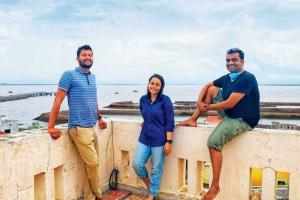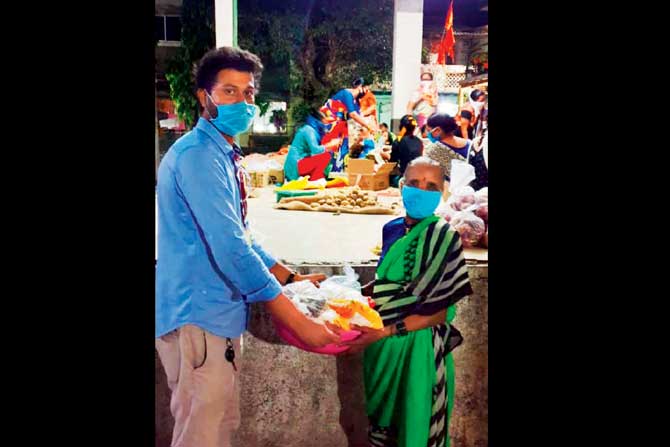Good things come out of a pandemic too. A fishing cooperative society has joined hands with a data analytics firm to use an app and QR codes in pushing for sustainable catching and consumption practices

Ganesh Nakhawa, director of Karanja Fishing Co-operative Society, Devleena Bhattacharjee, founder of Numer8 Analytics Pvt Ltd, and Myron Mendes from the Indian Network on Ethics and Climate Change

Nakhawa with a fisherwoman in Mumbai. Through their app, fisherfolk are able to identify fishing zones, acquire a good catch, eliminate middlemen and learn of weather safety guidelines
The pandemic only compounded the problem for small-scale fishers. A major issue that the team is battling is mislabelling of fish. "Eighty per cent of seafood gets mislabelled globally, which makes traceability a problem." In the process, fishermen earn a pittance from the sale that their produce would attract in big markets, she explains. Their effort is to expedite payment processes and create a business plan that will build resilience. "Typically, there's a delay of three to six months in receiving payments. Due to this, they end up falling prey to moneylenders." Bhattacharjee believes this is a result of the absence of formal, micro-financial institutions. "Banks ask them for data of their income, which they don't have." Her team has been helping them connect with legit financial services. In fact, they have generated a 10 per cent higher sales margin than pre-pandemic times, she tells us.

Nakhawa holds the Indian seabass. The team is trying to take attention away from the pomfret and rawas
They are now trying to leverage the momentum to shine a light on locally caught, seasonal seafood—and away from imported, commercial varieties. Nakhawa says that as part of their new practice, they have moved away from the popular pomfret, mackerel and Bombay duck, and have begun to supply grouper, red snapper, trevally and the Indian sea bass.

Fish is sold to customers with a QR code on the packaging, containing details about when and where it was caught
"We are trying to change eating habits. You can't eat salmon every day because it can't be caught every day. We work on the same principle as with all seasonal foods," says Nakhawa. Their goal is to supply what is available. "We don't want to be driven blindly by market demand."
To order: 9167161616 Whatsapp; @blucatch.seafoods, Instagram
Keep scrolling to read more news
Catch up on all the latest Mumbai news, crime news, current affairs, and a complete guide from food to things to do and events across Mumbai. Also download the new mid-day Android and iOS apps to get latest updates.
Mid-Day is now on Telegram. Click here to join our channel (@middayinfomedialtd) and stay updated with the latest news
 Subscribe today by clicking the link and stay updated with the latest news!" Click here!
Subscribe today by clicking the link and stay updated with the latest news!" Click here!







_d.png)



